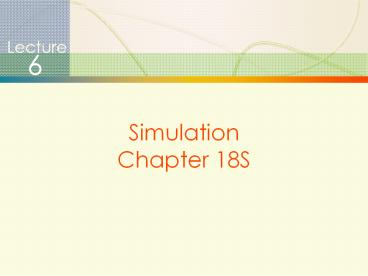PRODUCTIONS/OPERATIONS MANAGEMENT PowerPoint PPT Presentation
Title: PRODUCTIONS/OPERATIONS MANAGEMENT
1
Lecture
6
Simulation Chapter 18S
2
Simulation Is
- Simulation very broad term
- methods and applications to imitate or mimic real
systems, usually via computer - Applies in many fields and industries
- Simulation models complex situations
- Models are simple to use and understand
- Models can play what if experiments
- Extensive software packages available
- ARENA, ProModel
- Very popular and powerful method
3
Examples
- Manufacturing facility
- Bank operation
- Airport operations (passengers, security, planes,
crews, baggage) - Transportation/logistics/distribution operation
- Hospital facilities (emergency room, operating
room, admissions) - Freeway system
- Business process (insurance office)
- Fast-food restaurant
- Supermarket
- Emergency-response system
- Military
4
A Simulation Model
5
Electronic Assembly/Test System
- Produce two different sealed elect. units (A, B)
- Arriving parts cast metal cases machined to
accept the electronic parts - Part A, Part B separate prep areas
- Both go to Sealer for assembly, testing then to
Shipping (out) if OK, or else to Rework - Rework Salvaged (and Shipped), or Scrapped
6
Part A
- Interarrivals expo (5) minutes
- From arrival point, proceed immediately to Part A
Prep area - Process (machine deburr clean) tria
(1,4,8) minutes - Go immediately to Sealer
- Process (assemble test) tria (1,3,4) min.
- 91 pass, go to Shipped Else go to Rework
- Rework (re-process testing) expo (45)
- 80 pass, go to Salvaged Else go to Scrapped
7
Part B
- Interarrivals batches of 4, expo (30) min.
- Upon arrival, batch separates into 4 individual
parts - From arrival point, proceed immediately to Part B
Prep area - Process (machine deburr clean) tria
(3,5,10) - Go to Sealer
- Process (assemble test) weib (2.5, 5.3)
min., different from Part A, though at same
station - 91 pass, go to Shipped Else go to Rework
- Rework (re-process test) expo (45) min.
- 80 pass, go to Salvaged Else go to Scrapped
8
Run Conditions, Output
- Start empty idle, run for four 8-hour shifts
(1,920 minutes) - Collect statistics for each work area on
- Resource utilization
- Number in queue
- Time in queue
- For each exit point (Shipped, Salvaged,
Scrapped), collect total time in system (a.k.a.
cycle time)
9
Simulation Models Are Beneficial
- Systematic approach to problem solving
- Increase understanding of the problem
- Enable what if questions
- Specific objectives
- Power of mathematics and statistics
- Standardized format
- Require users to organize
10
Simulation Process
- Identify the problem
- Develop the simulation model
- Test the model
- Develop the experiments
- Run the simulation and evaluate results
- Repeat 4 and 5 until results are satisfactory
11
Monte Carlo Simulation
- Monte Carlo method Probabilistic simulation
technique used when a process has a random
component - Identify a probability distribution
- Setup intervals of random numbers to match
probability distribution - Obtain the random numbers
- Interpret the results
12
Different Kinds of Simulation
- Static vs. Dynamic
- Does time have a role in the model?
- Continuous-change vs. Discrete-change
- Can the state change continuously or only at
discrete points in time? - Deterministic vs. Stochastic
- Is everything for sure or is there uncertainty?
- Most operational models
- Dynamic, Discrete-change, Stochastic
13
Advantages of Simulation
- Solves problems that are difficult or impossible
to solve mathematically - Flexibility to model things as they are (even if
messy and complicated) - Allows experimentation without risk to actual
system - Ability to model long-term effects
- Serves as training tool for decision makers
14
Limitations of Simulation
- Does not produce optimum solution
- Model development may be difficult
- Computer run time may be substantial
- Monte Carlo simulation only applicable to random
systems

